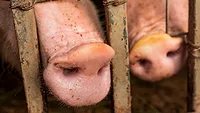Probiotics May Cause AMR in Cattle, Swine

Credit: Peddalanka Ramesh Babu/iStock / Getty Images Plus via Getty Images
A new study from Kansas State University explores the theoretical possibility of probiotics as a source of antimicrobial resistance (AMR). Probiotics are considered beneficial to human and animal intestinal health, and are often used in cattle and swine farms as an alternative to antibiotics. The study found that Enterococcus faecium, a bacteria strain that is often present in farmed animal probiotic products and naturally occurs in the human and animal flora hindgut, may cause AMR.
AMR can render animals, and the humans who consume those animals, defenseless against illnesses caused by microbiological infection. Since AMR presents a public health concern, producers are in search of replacements to antibiotics, which can increase AMR levels in bacteria. Probiotics are a possible solution, but the study’s findings suggest that future probiotic products may need to undergo AMR testing before they are greenlit for use in farmed animal products.
The study used whole genome sequencing to assess the virulence and AMR resistance genes of E. faecium strains that were isolated from commercial swine and cattle probiotics. The analysis suggested that, while E. faecium strains are unlikely to cause infections, the presence of genes in E. faecium that confer resistance to certain crucial antibiotics could present a risk as a source of AMR genes to other bacteria. Further research is necessary to determine the validity of these findings, although they do provide cause for investigation.
Looking for quick answers on food safety topics?
Try Ask FSM, our new smart AI search tool.
Ask FSM →









